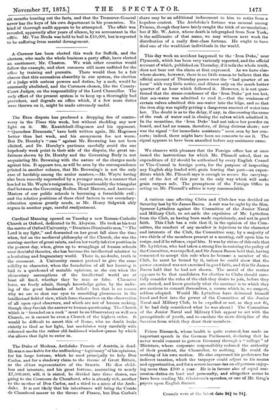A curious case affecting Clubs and Club-law was decided on
Saturday last by Sir James Bacon. A suit was brought by the Hon. Spencer Lyttelton against the Committee of the Junior Naval and Military Club, to set aside the expulsion of Mr. Lyttelton from the Club, as having been made capriciously, and not in good faith. This Club has a rule that if, in the opinion, of the Com- mittee, the conduct of any member is injurious to the character and interests of the Club, the Committee may, by a majority of two-thirds of the members present at a meeting, call upon him to resign, and if he refuses; expel him. It was by virtue of this rule that Mr. Lyttleton, who had taken a strong line in resisting the policy of the Committee, wasexpelled, and Sir James Bacon held that, having consented to accept this rule when he became a member of the Club, he must be bound by it, unless he could show that the power exercised was not exercised in good faith, and this Sir James Bacon held that he had not shown. The moral of the matter appears to be that candidates for election to Clubs should care- fully consider the mice of the club they desire to join, before they are elected, and know precisely what the contract is to which they are anxious to commit themselves, a course which is, we suspect, seldom adopted. Would Mr. Lyttelton have delivered himself hand and foot into the power of the Committee of the Junior Naval and Military Club, to be expelled or not, as they saw fit, if he had duly considered what he was about? The Committee of the Junior Naval and Military Club appear to act with the promptitude of youth, and to emulate the stern discipline of the Services from which they draw their members.


































 Previous page
Previous page